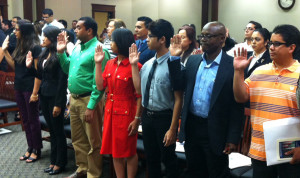
By Steve Brawner
The next six months are going to tell us a lot about what kind of country this is, and whether the United States Congress is still capable of fulfilling its constitutional duties.
That’s because Congress now has a deadline, and unlike past deadlines, it’s not one that can just be postponed through a continuing resolution or legislative trick. This time, 800,000 young people depend on Congress acting.
Now we have a deadline
The deadline was set by President Trump, who this week announced that the Deferred Action for Childhood Arrivals program will end in six months and urged Congress to act. Under the program, qualifying undocumented immigrants brought to America as children don’t have to worry about deportation. It doesn’t make them legal, but it makes them less illegal.
President Obama created DACA by an executive order in 2012, calling it “temporary” even then. While its intentions were good, it likely exceeded his constitutional authority. Congress, after all, makes the laws. There’s a good chance it would not have survived a lawsuit filed by nine state attorneys general, including Arkansas’ Leslie Rutledge.
Not surprisingly, Trump was condemned by some after his administration announced its decision Tuesday. After all, he did build his political brand by promising a wall that would keep out immigrants and be paid for by the Mexicans.
A chance to be Americans
But in reality, Trump’s decision probably did a favor for DACA’s beneficiaries, known as “Dreamers.” Had a court ruled against the program, they could have lost its protections immediately. This way, the lawsuit has been dropped while Congress has a chance to act over the next six months.
In fact, the Dreamers might come out ahead. Under DACA, they wouldn’t have been deported but they never would have been Americans. They would never have been able to vote or be eligible for certain benefits for which they already pay taxes. Their status depended on an executive order that could be rescinded by any president at any time.
Will Congress act?
The Trump administration’s announcement forces Congress out of its hidey-hole. No longer can it rely on a potentially unconstitutional presidential order. As Trump tweeted, now it must do its job.
So will it? Speaker Paul Ryan and Senate Majority Leader Mitch McConnell both expressed sympathy for the Dreamers, but then, they also wanted to repeal Obamacare. The statements released by Arkansas’ all-Republican congressional delegation showed a desire to create a comprehensive solution, and they did not direct hardline anti-immigration rhetoric at the Dreamers. Rep. Steve Womack, who represents Northwest Arkansas’ 3rd District, said he has “a heart for their plight” and hoped that “proper relief can come for the young people who know only America as their country.”
The member of the state’s delegation playing the hardest ball is Sen. Tom Cotton, who used the occasion to push his own RAISE Act, which would set new limits on legal immigration.
So now we’ll see if the system created by the Founding Fathers still can work. The Dreamers’ situation comes from government’s failure to perform core constitutional functions – securing the borders and creating an orderly process of citizenship. In the land of the free, human beings live a second-class existence. Congress failed on health care because it’s really hard and because any policy change produces winners and losers. But on this issue, failure mostly would produce 800,000 clear losers. That should make it easier to act. Moreover, the will of the majority is clear. In a Morning Consult/Politico poll, 76 percent of respondents said the Dreamers should be allowed to stay while only 15 percent want them deported.
If Congress fails to meet the deadline, then the government will once again punish these young people for their parents’ actions and for the immigration system’s own failures. Best-case scenario is they’d live under a new “temporary” executive order that doesn’t solve the problem. Otherwise, they’ll be forced back into hiding or deported to homelands many don’t recognize. Only a mean country would do either.
Moreover, failure to act means we waste 800,000 young, mostly healthy assets who are needed to support our aging population. For many of them, taxpayers have already invested hundreds of thousands of dollars to pay for their public educations. Some have advanced degrees, and a small number have served in the military.
Throwing all that away is something only a stupid country would do.
We’re not mean or stupid, are we? I guess we’ll find out within the next six months.
Related: Out of the shadows.
Steve Brawner is an independent journalist in Arkansas. Email him at brawnersteve@mac.com. Follow him on Twitter at @stevebrawner.
© 2017 by Steve Brawner Communications, Inc.
Wow! “Amen” seems inadequate as a response to that column.
A very informative article. I would love to see these young people stay in the US, however my question remains the same as many others ” Why have these individuals not already sought citizenship? That would have been one of my first dreams as a dreamer to officially become a citizen, if they are not yet the age of 18 and have not lived in the U.S. for five years then give them the five years but no more to become citizens. If they fail to do so then deport them, it would appear at that point that they really don’t care about being a responsible American citizen at all.
Shirley,
DACA recipients cannot apply for citizenship.
http://www.abc2news.com/news/national/why-daca-recipients-cant-apply-for-citizenship